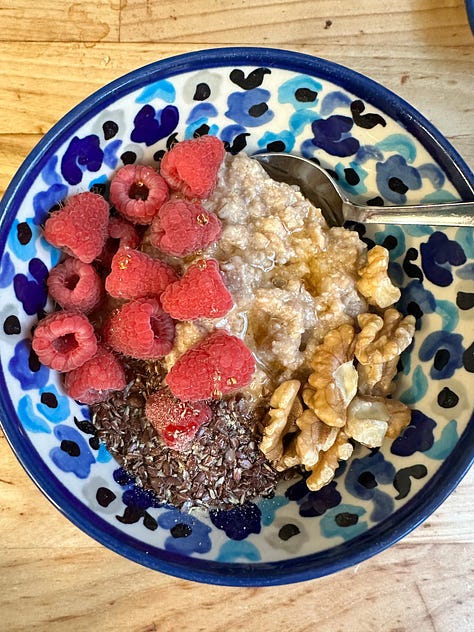
I regularly share pictures of my morning oatmeal in my Instagram stories and jokingly call myself the chief defender of oatmeal. Without fail, someone will send me a link to someone saying that oatmeal isn’t “healthy”.
March is Nutrition Month, and it's the perfect time to explore the practical side of gentle nutrition. If you’ve been curious about my intuitive eating menopause nutrition community, now’s a great time to join as your first month is 50% off!



If you’ve spent any time in wellness spaces, you’ve probably encountered some wild takes on food. And, oatmeal has somehow found itself in the crossfire of internet-fueled food fearmongering, with critics claiming it spikes blood sugar, causes weight gain, or that it’s toxic “peasant” food.
But here’s my take: Oatmeal is delicious and nutritious. Whether you enjoy it every day or just need a satisfying breakfast in rotation, don’t let the naysayers talk you out of it.
Here’s why oatmeal deserves a place on your midlife plate.
1. Oatmeal Is a Fiber Goldmine
If you’re in midlife, you’ve probably heard about fiber. It helps keep our gut bacteria well-fed, can help lower cholesterol, stabilize blood sugar, and keeps digestion running smoothly. But, according to recent data, most people aren’t getting enough of it. A 30 gram serving of oatmeal (~1/3 cup dry) delivers about 4 grams of fiber, including beta-glucan, the type of soluble fiber that can lower LDL (“bad”) cholesterol and serve as food for our gut bacteria.
Oatmeal deniers often claim it’s too high in carbs, but context matters. First, carbs aren’t a problem. Second, the fiber in oats slows digestion and the resulting (normal) rise in blood sugar. When paired with protein and fat (like nuts, seeds, or yogurt), it’s easy to build a balanced meal that will keep you full and satisfied for hours.
2. Oatmeal Supports Heart Health (And That’s a Big Deal)
Critics who dismiss oatmeal as just “empty carbs” ignore the well-documented benefits for heart health. Cardiovascular disease is the leading cause of death for women, yet heart health is often overlooked in midlife nutrition conversations. The beta-glucan in oats doesn’t just support digestion, it also helps reduce cholesterol and studies show that regularly eating oats can lower LDL cholesterol by 5–10%.
That’s an impressive shift for any food, let alone a humble bowl of oats!
3. Oatmeal Is an Easy Way to Add Nutrient Density
Fiber isn’t oatmeal’s only claim to fame, it’s also a good source of other nutrients that support midlife health. Oats are a good source of:
Magnesium (for muscle function and relaxation)
Iron (important for energy and oxygen transport)
B vitamins (for energy metabolism and brain health)
Zinc (for immune function and skin health)
Oatmeal deniers might say it’s "not enough" on its own, but as a whole grain, oats do contain some protein. And if you top your oats with nuts, seeds, or fruit, you amplify the nutrient density even more.
4. Oatmeal Is Blood Sugar-Friendly
If cutting carbs to manage insulin resistance and diabetes was the answer, we wouldn't have so much research to support the benefits of including whole grains (even starting the day with oatmeal) for people living with diabetes. Whole-grain consumption appears to reduce the risk of diabetes, probably because oatmeal can temper the rise in glucose and insulin after a meal.
As always, nutrition by addition can make your morning bowl of oats even more balanced, filling and satisfying.
Adding protein and fat, like Greek yogurt, nuts, seeds, or nut butter
Including fiber-rich toppings, like berries, chia seeds, or flaxseeds
Making is savoury by topping your cooked oatmeal with an egg or two.
5. Oatmeal Is Affordable, Versatile, and Keeps You Full and Satisfied
Nutrition trends love to push expensive, hard-to-find foods as the key to health. Meanwhile, oatmeal remains one of the most budget-friendly, accessible, and satisfying breakfast options out there.
Unlike many trendy breakfast alternatives, oats are easy to prepare, customizable, filling and satisfying! The combination of fiber, protein and slow-digesting carbohydrates makes it a meal that can sustain your energy levels.
Oatmeal deniers will argue that eggs or smoothies are better, but you don’t have to pick sides. There’s always room for variety in a balanced diet. Learning to ditch the all-or-nothing thinking is a key intuitive eating skill that can make eating in midlife much easier.
The Bottom Line
Oatmeal isn’t magical or a “super food” (I hate that term), but it is a nutrient-dense, affordable, and a science-backed choice that supports heart health, digestion, and overall well-being, all things we can all benefit from in midlife.
So, the next time someone tells you to avoid oatmeal, ask yourself: are they basing that advice on research or an influencer’s opinion? Because science (and a satisfied stomach) says oatmeal stays.
I share two of my favourite overnight oat recipes in this free guide, if you’re looking for a new recipe to try!
What’s your favourite way to enjoy oatmeal?



I have porridge every morning and I love it. I batch-prep my dry mixes (incl. chia, hemp, almonds, coconut flakes, turmeric, ginger, cinnamon, raisins) for a week ahead and just pour on hot water or oat milk, top it with fresh fruits and roasted cocoa nibs.
Team oats here! We have oatmeal with dried cranberries twice a week. I have a muesli full of oats, fruit and nuts the other days.